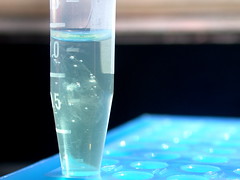
Image by gravitywave via Flickr
Last week I wrote about using genetic genealogy databases to identify someone’s surname (see “DNA Could Reveal Your Surname, Of Course.”)Â The article discussed results from researcher Dr. Turi King which suggested that there is a 24% to 50% chance that two men who share the same surname share a common ancestor through that name, with chances increasing if the surname is rare.
Somehow I completely missed “Adoptees use DNA to find surname“, an article at BBC News this June. Men who were adopted as children are using genetic genealogy databases in an attempt to identify their biological surname. This is Dr. King’s research in motion. Family Tree DNA, for example, has a project for Adopted people that is over 2 years old, and has a success rate of more than 30%, thanks in large part to their database of over 130,000 records. From Bennett Greenspan:
“We now have a growing number of people who are adopted, who have tested with us and have matched several individuals with a particular surname, and maybe they haven’t matched anyone else with a different surname. From that, they can get the idea that they have at least found the surname they need to start looking for in the town in which they were born.”
The BBC article ends with Mark Jobling predicting what will happen in the future as technology opens doors for adopted individuals, stating that “tests offering better resolution on the whole genome should be able to solve other familial puzzles.”
![Reblog this post [with Zemanta]](http://img.zemanta.com/reblog_e.png?x-id=f85e8814-4861-461d-a2b0-29670e9dacc5)
well, now that i’ve got my dna where do i go from here? Joseph Renshaw was born 1815 Eng. and Niall lived 2000 years earlier and nere the twain shall meet. the first record i have for Joseph was when he got married in 1838 Lancaster Ohio to Hannah Wright.
Marie
Marie – I know you’ve been pretty unhappy with the results of your genetic genealogy test, so I’m going to contact you privately to help you as much as I can.
How can a group of descendants whose common ancestor is less than 12 generations back use DNA to sort out which of this ancestor’s children was their forebear? The records in Virginia are burned & confirming kinship has been a brick wall for family researcher for more than sixty years.
Thanks!
will you still talk to me Blaine? i would like some conversation about my ancestry. email me soon.
Marie
This sounds good in theory, but in practice it’s turning out to be more complicated. In my case, I got 24 different perfect matches in the Genebase database for 18 markers or more (including 19/19, 20/20, and 24/24). Only two of those had the same surname. On Ysearch (which is full of relatively useless 12 marker tests) I get dozens of 12/12 matches. If you go by conventional wisdom on TMRCA calcuations, those 18/18 matches should all have around a 40-50% chance of being within a dozen generations or so, but this seems to imply the absurdity that on average I have 12 different surname matches. I have seen suggestions that the modality of common haplogroups (I’m the extremely common R1b) radically alters TMRCA probablities from the conventional models that the commercial testers use (http://www.jogg.info/42/files/Nordtvedt.htm, q.v.), and I’m starting to think that there is really something very wrong with the statistics in these models as they pertain to surname searches.